- Home
- Jim Thompson
The Alcoholics Page 8
The Alcoholics Read online
Page 8
“Well, let it go,” said Doc. “Sit down.…How are you feeling, by now? Like to have a good big shot?”
“Gosh, you mean I”—Jeff sat down—“I—uh—guess not.”
“Sure you would,” said Doc. “You feel like you made a horrible horse’s ass of yourself—which you did, of course—and you want a drink to forget it. Well, that’s all right. Want it. Just don’t take it.…Incidentally, what’s your attitude toward the booze now? Still think you can handle it?”
“Well, I—it certainly hit me hard this time. The little bit I had this morning. Why, Doc, I can—I’ve polished off a couple of pints in an—”
“You’ll never be able to do it again,” said Doctor Murphy. “Or maybe I should say you’d better not do it unless you’re prepared to face much worse situations than you created a while ago. You’ve crossed the line, as we say in alcoholic circles. You’ve lost your license to drink. From now on, every drink you take will affect you a little worse than the last one. I tell you that. Bernie or the Holcombs or the General or any other alcoholic will tell you the same thing.”
“Why do they drink then?” said Jeff.
“That I don’t know. I can point to certain things which are factors in their drinking, but I can’t answer the basic questions. I can tell you this: It’s ten times harder for a man Bernie’s age to stop drinking than it would be for you.…Tell me, why do you want to drink anyway?”
Why? Jeff shook his head. “I don’t know, exactly, never thought much about it. There’s a lot of drinking in my line of work, and well, you get all keyed up and can’t let down—or you need a little lift when—”
“No,” said Doc. “Those are excuses. They’re not the reason. There’s only one reason any alcoholic ever drinks. Because he’s afraid. I know—I seem to be contradicting myself there. I do know why Bernie and the others keep on drinking, but I don’t know the why of that why. What makes them afraid, that is. Why they keep on trying to bolster their courage with whiskey when it does nothing for them anymore and does so much against them.”
“I don’t know, Doc,” said Jeff carefully. “Not bragging, but I’m considered a—”
“I know. But whatever you’re considered—iron-nerved, a pinch-hitter, a guy who knocks ’em cold and wraps ’em up—it isn’t enough for you. You’re afraid. You’ve got to keep showing people. The more you show ’em the more you have to. And when you can’t…”
“Well, maybe…”
“No maybe, Jeff. You’re that way. What you have to do is accept the fact—and accept yourself as you are. Right now your fears are illusory; they have no actual basis for existence. But if you keep on drinking, you’ll have very real cause for fear. You’ll be afraid to meet people, afraid they’ll snub you or talk about you. Your work will start slipping, and the more it slips the greater the tendency for it to keep slipping. In short, you’ll not only think you’re a bum but you’ll be one. And with all respect to my patients, I’m not using the word too loosely.”
Jeff grinned half-heartedly. “I don’t doubt you at all, Doc. I know I certainly acted pretty stupid. But—”
“Yes?”
“Well, it’s…I don’t mean that I’m any stronger or better than these other fellows, but—well, I don’t think my own case is quite the—”
“I see,” said Doc quietly, fighting down a wild desire to laugh—or weep. It hadn’t done any good. It never did. They were intelligent people, and you laid it on the line for ’em. And they listened and nodded, and threw in a word now and then. And when you were through…“I see,” he repeated. “Bernie Edmonds—they didn’t come any better than Bernie. And the General and the Holcombs; you know who they are. All big men, smart men—and they can’t handle it. But you can.”
“Well, now”—Jeff squirmed—“I didn’t say that, Doc. I know I’ll certainly have to watch myself from now on, be doggone careful when I drink, but—”
“But you’re not an alcoholic. A real alcoholic. You’ve just been drinking too much, and all you have to do is cut down on it. Well, you could be right. I’ll have your clothes brought back to you and you can leave.”
“Leave!” Jeff sat up sharply. “B-but—I am a little shaky yet, Doc—”
“Oh, you can fix that,” said Doctor Murphy. “Put a few stiff ones under your belt—just enough to get straightened out on, you know—and you’ll be all right. But I want you to do me a little favor before you go. I’ve got a problem I want to discuss with you in confidence, the strictest confidence, understand, and get your advice on. I’ve been needing to talk it over with someone, but there’s no one here but these alcoholics and—”
He shrugged deprecatingly, and stood up. Jeff also arose slowly, his eyes searching the Doctor’s face.
“Look, Doc, I’m not—I don’t think I’ve made myself exactly clear—”
“Sure, you have. You’re not an alcoholic, and I need to talk this over with a non-alcoholic. Someone whose advice will be unprejudiced and dependable. You don’t mind helping me out, do you? It’ll only take a few minutes, and then you can leave.”
“But—” Jeff still hesitated, trying to discover some vestige of irony in the doctor’s countenance or words. There seemed to be none. For that matter, there may well have been none. Certainly, Doctor Murphy knew the futility of trying to convince a man, by any method, against his will.
“All right, Doc,” said Jeff. “I don’t know—”
“I’ll explain,” said the doctor, and he led the way out of the room and up the stairs.
They reached the heavy door of Room Four, and Doc pushed. The door swung open, and they stepped in, and—
“Oh, my God,” he groaned.
12
Humphrey Van Twyne III still lay motionless in his cocoon of winding sheets, raised slightly off the horizontal now by the tilting upward of the table slab. On the far side of the table, the side furthest from the door, was a small serving stand which Rufus was facing, his back to Humphrey Van Twyne.
The index finger of his left hand was clenched tightly between Van Twyne’s teeth.
Doctor Murphy took in the component parts of the picture in one swift glance. Obviously, Rufus had turned toward the serving stand, while he was still giving Van Twyne a bite of food. And Van Twyne had snapped down on his finger, thus holding his hand behind him, holding him helpless.
The big Negro was trembling with strain and fear. Doc stepped swiftly around in front of him, looked reassuringly into the ashen face.
“Have you loose in a moment,” he whispered. “How bad has he got you? Into the flesh?”
“D-d-don’t think s-so, suh. I j-just r-r-reachin’ ovah—”
“Sure. Might have happened to anyone, and you handled it just right. Now, just hang on and—”
Doc turned, wheeled around Jeff, standing wide-eyed and pale, and looked down into Van Twyne’s unwinking idiot’s eyes. He raised a hand—dropped it again. Useless to pinch his nostrils shut; he could still breathe through his mouth. And his instinctive animal reaction to a seeming attack would be to clamp down on that finger.
Doctor Murphy raised his hand again, his left one, and laid it gently against Van Twyne’s head. He began stroking the bandages, softly, soothingly. “Good boy,” he murmured. “Good, fine, nice. Good boy, good, good, good…Rufus, move back this way as far as you can but don’t move your finger.…Good, nice, fine, good, good, good boy…”
Doc’s hand moved up to Van Twyne’s forehead, rested there a moment, caressingly, and slid slowly downward until it was lying over the man’s eyes. “Good, good boy, sleepy-bye good boy, nice fine good sleepy…Rufus…a fine good…Rufus, this good, good boy has…all right, Rufus…”
Rufus pulled. His finger slid free, and he staggered forward and went down on his knees. Doc helped him to his feet, stood with an arm hugging the Negro’s shoulders as he nodded to Jeff Sloan.
“Rufus showed a great deal of intelligence there,” he said quietly. “He analyzed his problem, realized that it
was something requiring outside help. He’d rather have done without it, naturally; he’d made a mistake and wound up in an embarrassing and painful position. But he knew what had to be done, and he did it. If he hadn’t—if he’d refused to face the facts, and wait for help—he’d have lost a finger. We might even have found him dead up here, bled to death.”
Doc examined the finger and saw that the skin, while deeply tooth-marked, was unbroken. He advised antiseptic and a hot-water immersion, helped Rufus through the door with his tray and serving stand, and turned back to Jeff.
“That Rufus”—be grinned fondly—“I blow my top with him on the average of twice a day, but I wouldn’t trade him for any two people I’ve got. He may screw things up, but he never lets you down. He has so very little, but he pours it all out for you and scrapes his insides for more. If you and I did as much with what we have—our opportunities and knowledge and backgrounds—well…” Doc shrugged and drew Jeff closer to the table. “This is it,” he said. “This is what I wanted to talk to you about.”
Jeff’s gaze veered away from the expressionless white face, its eyes again wide in an unblinking, unseeing stare. His voice was a barely audible whisper. “W-who is it—he?”
“I think you must have heard of him. He’s been out of circulation for some time, but I’m sure you must have heard of him. Humphrey Van Twyne III?”
“Him! But—yeah,” said Jeff, his lips curling. “I’ve heard of that crum!”
“Mmmm. You think he was responsible for what he did then? He was the way he was because he liked it that way. He was just one of the bad guys…as a seven-year-old would say of a movie villain?”
“Well, all I know is—” Jeff colored. “I guess maybe he wasn’t—”
“He wasn’t. Mr. Van Twyne here was simply an alcoholic who refused to admit his malady and who had unlimited funds for indulging it.…Ever think how nice it would be, when you had a hangover, if you didn’t have to go to work? If you could call up a dame, say, and keep the party going? If you could tell the whole world where to get off and give it a kick in the ass if it didn’t move fast enough? Well…be glad you weren’t able to.”
Jeff swallowed, his eyes drawn unwillingly to the thing on the table. “Is he…crazy?”
“Oh, no. Being crazy presumes an intelligence, and Van Twyne hasn’t any. He probably retains some memory of adult life, but it’s doubtful that he relates it to himself. Generally speaking, he’s on the mental level of an infant.”
“Why”—Jeff nodded—“why do you keep him like that? Is he dangerous?”
“Somewhat. A baby will bite and strike, and a baby of this size could be rather painful. But the danger is mainly to himself. You know. Might masturbate himself raw, or eat his own excrement. Things of that kind.”
Jeff shook his head. “What are you going to do with him?”
“That,” said Doctor Murphy, “is what I wanted to ask you about. What to do?”
He began to talk, outlining the story of Humphrey Van Twyne and the facts of his own dilemma. He spoke calmly, almost casually, neither ornamenting nor understating the awesome and terrifying facets of the situation. Talking as though the responsibility were not his but Jeff’s.
And Jeff listened, moistening his lips, now and then, fine beads of sweat oozing through the pores of his forehead.
“Well, that’s it,” Doc concluded, and he glanced down into Van Twyne’s inscrutable face. “It would be odd if he understood any of that, wouldn’t it? Of course, he hasn’t had much say-so about his own movements for quite a while; but it would still seem strange. Hearing yourself discussed and disposed of, and having no voice in the matter.”
Jeff didn’t seem to have heard him. He spoke stubbornly, a little querulously. “He’s got nothing to do with me. Hell, he’s one guy in a million. There isn’t a man in a million who’d wind up in this spot!”
“That’s right,” Doc agreed. “Very few alcoholics are able to hand it out as long as Humphrey did. They get it handed back to ’em in a way that stops the dishing-out process. Someone kicks their brains out or they get pulled in for drunk-driving or manslaughter or robbery. They burn themselves up in their beds or starve or freeze in some doorway. Or perhaps they wind up in a nut house. But…I’m afraid you’ve got me wrong, Jeff. I’m not trying to frighten you.”
“I’ll bet!” Jeff grinned weakly.
“I mean it. Alcoholics can’t be frightened away from drinking. Their own fear of self, until they can recognize it for the baseless and unreasonable thing it is, is much greater than their fear of anything else. No, you can’t frighten ’em, and since you’re not one—since you’re not immediately concerned with the disease—it would be less than pointless to try to frighten you.…I brought you up here for just one reason: to get your idea on what I should do.”
“Well”—Jeff hesitated—“there’s really no other way?”
“None. And I haven’t any more time. Oh, I’d be allowed to hang on a few days and wind things up, but practically speaking this is my last day—unless. I’ll have to make my decision by late afternoon, get the money by then, or I’ll be out of business.”
“And you’re sure you can’t do anything for this guy if—”
“How could I? It’s by no means certain that the men who operated on him, specialists, can do much for him. The question is, ethicalities aside, should he have that chance or should my patients—you’ve only met a few of the total—have a chance? Frankly, I don’t seem to have accomplished much with them. I’m just about as far from the answer to alcoholism as I was in the beginning. But—”
“What makes you so sure, Doc?”
“What?” said Doc, irritably. “I’ve just got through explaining that—”
He broke off, looking at Jeff. And Jeff grinned back at him, grinned in a way that was at once baffled and serious and glad.
“You know something, Doc? I’m never going to take another drink as long as I live.”
Doc blinked, and his mouth twisted wryly. “Well, naturally, I’m glad you recognize the danger. But if I had a dollar for every alcoholic who told me—”
“But I’m not going to,” said Jeff. “Whether I’m an alcoholic or not—well, I guess I don’t like that word very much, so let’s just say I’m a guy who can’t drink and isn’t going to drink.”
Doc’s heart began to pound. A great smile spread over his bony face.
Just one man! Just to pull one of them back, to know that it hadn’t all been wasted.…But if you could do it with one…
“What made you change your mind, Jeff?”
“I don’t know. I know in a way, but I can’t quite put it into words. Not now, anyway. Maybe I—you’re not going to make me leave this afternoon?”
“You’re damned right, I’m not!” vowed Doctor Murphy. “You and I have some more talking to do.”
“Well, I think I’d be all right if I left. But I want a chance to talk to the boys, Bernie and the General; fix things up with them for the way I acted at lunch.”
Doc started to nod. He caught himself. He had to be sure—as sure as it was possible to be.
“Well, I don’t know about that,” he said. “After all, Bernie was pretty insulting to you. They all acted pretty lousy for that matter, letting you make a fool of yourself and then bawling you out or giving you the silent treatment. Why should you—?”
Jeff laughed openly.
“You know damned well I should. If I didn’t, I’d be all hot and bothered and worried, the same way I’ve been a hundred other times when—”
Doc’s hand came down on his back with a resounding whack.
“Jeff, if you don’t make it, then it can’t be made! If you don’t do it, I think I’ll—”
“I’ll make it,” said Jeff.
“I believe you will! By God, I believe you will…Now, let’s get out of here and—”
Jeff hesitated. “What about him, Doc?” he said.
And Doc’s face went blank for a moment. “Oh,�
�� be said, slow. “Yeah…”
“Were you leveling with me? Did you really expect me to tell you what to do?”
“I—I don’t know,” said Doctor Murphy. “But as long as I did ask you…”
“I don’t know, Doc. I—God, I wouldn’t want to say! I mean, whatever you—”
“Yes,” said Doc. “I know what you mean.”
13
The several case reports had been typed and laid on his desk, but Miss Baker was still sitting at the small typewriting stand when Doctor Murphy entered his office. She sat very erect, her small white-shod feet squarely on the floor, her hands folded neatly in her lap. She looked a little like a shy child in a strange house, placed in one spot and afraid to move out of it.
Doc sat down at his desk and looked through the reports; pretended, rather, to look through them. He already knew their context by heart. He knew that Miss Baker’s letter-perfect typing would need no checking. What he did not know was how to begin with her.
He looked up at last, nervously, trying to sound informal and jovial and succeeding largely in sounding brusque. “Well,” he said, “no use in sitting there in the corner by yourself.”
Miss Baker was on her feet instantly. Then she stood looking at him politely, waiting for further directions.
“Over here,” said Doctor Murphy, “I want to talk to you, Miss Baker.”
“Yeth, thir,” said Miss Baker. “Oh, I’m sorry, sir—”
“Now, let’s not make a project out of it,” said Doc, gruffly. “Just sit down and—uh—relax.”
Miss Baker sat down in the chair at the side of his desk, but she did not appear to relax. She sat as she had at the typewriter, starch stiff, hands folded in her lap, her neat sweet features fixed in a small smile of polite wariness.
“Now, Nurse,” he said. “I think we’re considerably overdue for a talk. The situation here has been, uh, rather unsettled—and it still is. Very unsettled. So I felt that if we were going to get certain matters cleared up…make any attempt to clear them up…we’d better be getting started.”

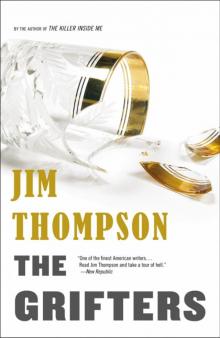 The Grifters
The Grifters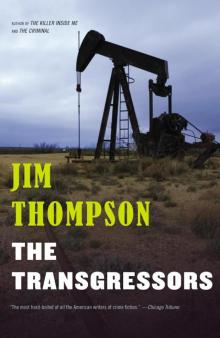 The Transgressors
The Transgressors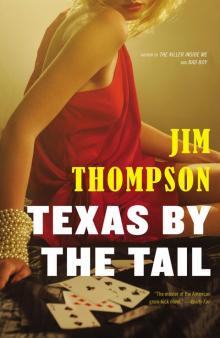 Texas by the Tail
Texas by the Tail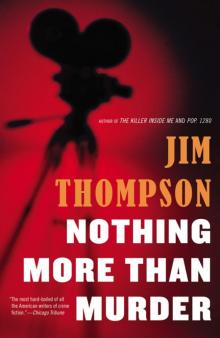 Nothing More Than Murder
Nothing More Than Murder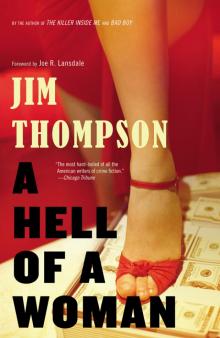 A Hell of a Woman
A Hell of a Woman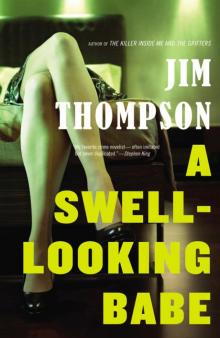 A Swell-Looking Babe
A Swell-Looking Babe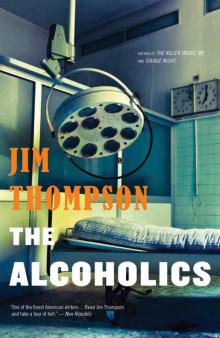 The Alcoholics
The Alcoholics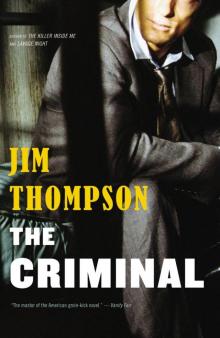 The Criminal
The Criminal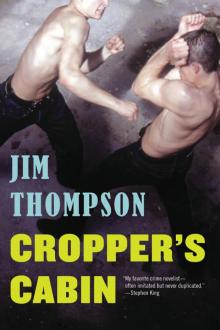 Cropper's Cabin
Cropper's Cabin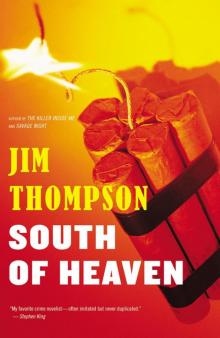 South of Heaven
South of Heaven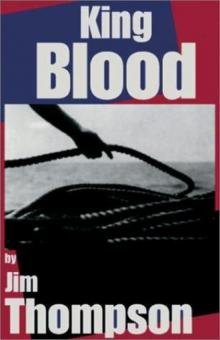 King Blood
King Blood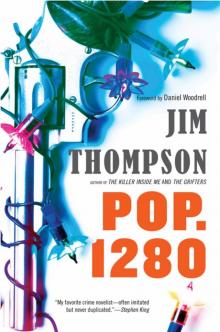 Pop. 1280
Pop. 1280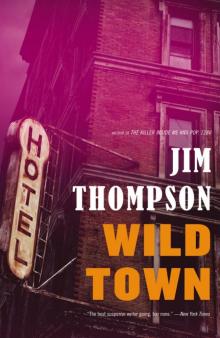 Wild Town
Wild Town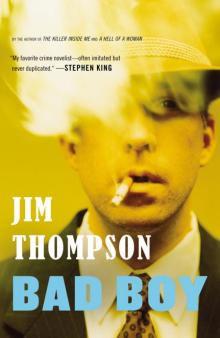 Bad Boy
Bad Boy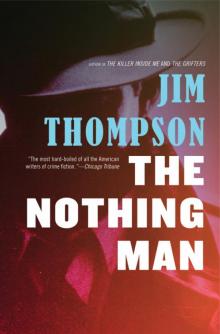 The Nothing Man
The Nothing Man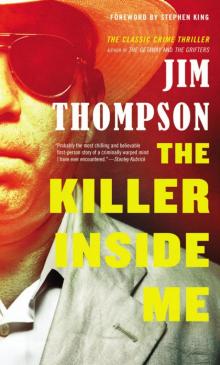 The Killer Inside Me
The Killer Inside Me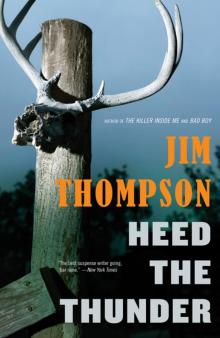 Heed the Thunder
Heed the Thunder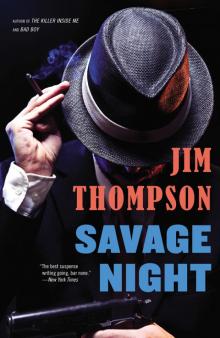 Savage Night
Savage Night Recoil
Recoil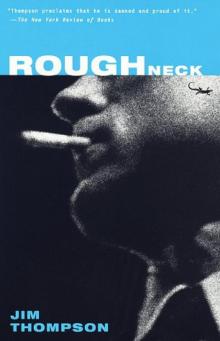 Roughneck
Roughneck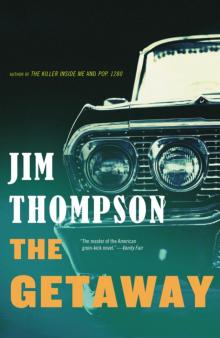 The Getaway
The Getaway